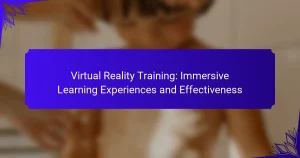Artificial Intelligence is revolutionising education by personalising learning experiences and enhancing administrative efficiency. However, it also presents challenges such as data privacy concerns and equity in access. Emerging applications include predictive analytics and AI-driven tutoring systems that provide tailored support. Future trends indicate a shift towards adaptive learning technologies and immersive environments, aiming to improve educational outcomes.
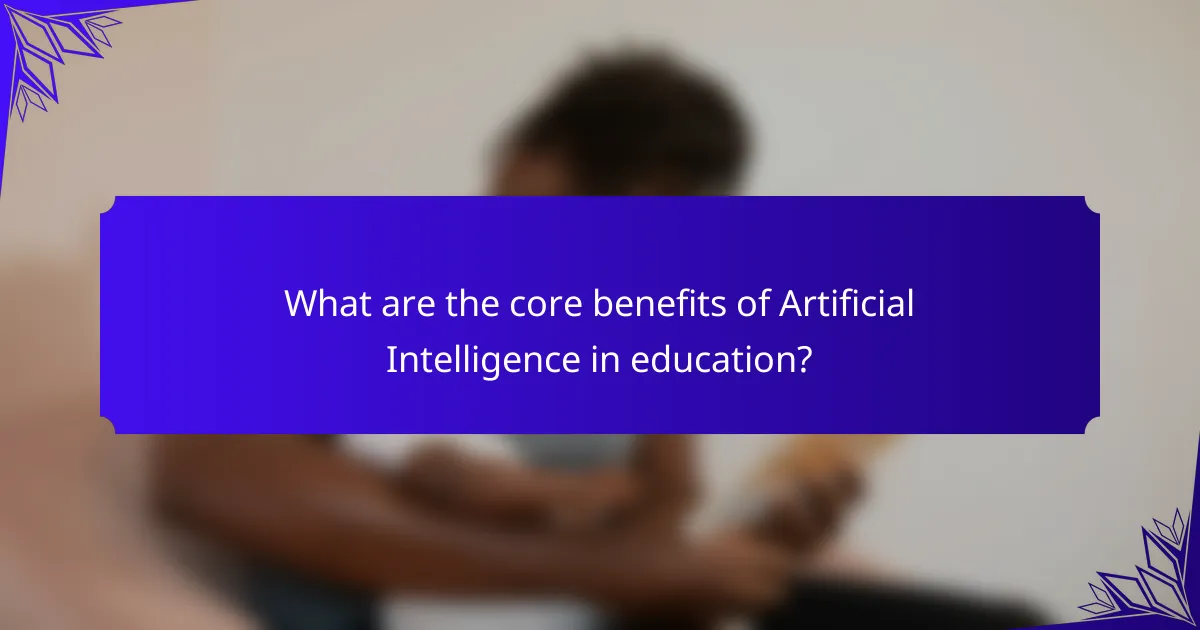
What are the core benefits of Artificial Intelligence in education?
Artificial Intelligence enhances education by personalising learning, improving administrative efficiency, and providing data-driven insights. Personalised learning experiences adapt to individual student needs, promoting engagement and retention. AI streamlines administrative tasks, allowing educators to focus more on teaching. Data analytics helps identify trends and areas for improvement, leading to better educational outcomes.
How does AI enhance personalised learning experiences?
AI enhances personalised learning experiences by tailoring educational content to individual student needs. It analyses learning patterns and preferences, allowing for adaptive learning paths. AI-driven platforms can recommend resources, adjust difficulty levels, and provide real-time feedback. As a result, students engage more effectively, improving retention and academic performance. The unique attribute of AI in this context is its ability to process vast amounts of data quickly, enabling a more customised approach to education.
What role does AI play in automating administrative tasks?
AI significantly enhances the automation of administrative tasks in education. By streamlining processes like scheduling, grading, and communication, AI reduces workload and increases efficiency. For instance, AI-powered systems can analyse student performance data to generate personalised feedback, allowing educators to focus more on teaching. Additionally, AI chatbots can handle routine inquiries, freeing up staff for more complex issues. This integration not only improves operational efficiency but also enriches the learning experience by allowing educators to dedicate more time to student engagement and support.
How can AI improve student engagement and motivation?
AI can significantly enhance student engagement and motivation through personalised learning experiences. By analysing individual learning patterns, AI systems can tailor educational content to meet diverse student needs. This customisation fosters a sense of ownership and relevance, encouraging students to take an active role in their learning.
Furthermore, AI-powered tools can provide real-time feedback, allowing students to identify areas for improvement. This immediate reinforcement boosts motivation and helps maintain engagement. Gamification elements, driven by AI, can also transform traditional learning into interactive experiences, making education more enjoyable and stimulating.
Additionally, AI can facilitate collaboration among students through smart groupings based on skill levels and interests. This promotes peer interaction, which is essential for motivation and engagement. Overall, the integration of AI in education presents unique opportunities to create a more dynamic and responsive learning environment.
What are the advantages of AI-driven assessment tools?
AI-driven assessment tools offer numerous advantages, including personalised learning experiences and efficient data analysis. These tools adapt to individual student needs, enhancing engagement and understanding. They provide real-time feedback, allowing educators to identify areas for improvement quickly. Additionally, AI tools can analyse vast amounts of data to uncover trends, enabling informed decision-making. The unique ability to tailor assessments based on learning styles differentiates AI-driven tools from traditional methods.
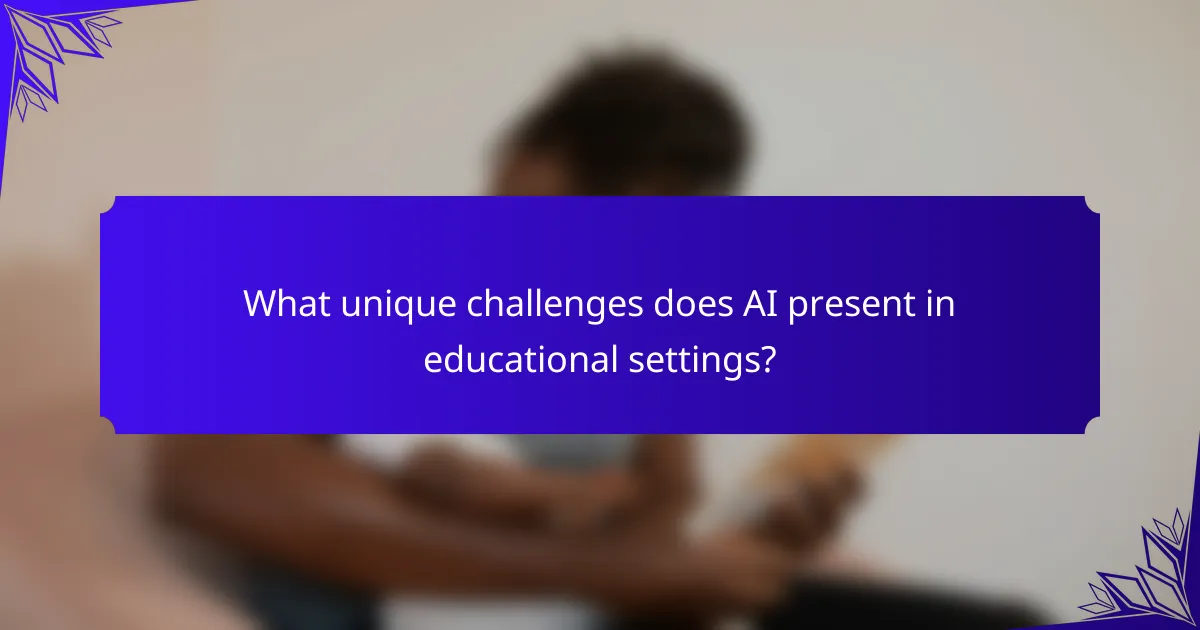
What unique challenges does AI present in educational settings?
AI presents unique challenges in educational settings, including data privacy concerns, equity in access, and the need for teacher training. Data privacy issues arise as AI systems collect and analyse student information, raising concerns about security and consent. Equity in access can create disparities, as not all students have equal access to technology and resources. Additionally, teachers require training to effectively integrate AI tools into their classrooms, which can be a significant hurdle. These challenges must be addressed to harness the full potential of AI in education.
How does data privacy impact the implementation of AI in schools?
Data privacy significantly impacts AI implementation in schools by necessitating stringent data protection measures. Schools must navigate legal regulations like FERPA, ensuring student data remains confidential. This challenge can limit the scope of AI applications, as robust privacy protocols may hinder data collection essential for AI learning algorithms. Additionally, concerns about data misuse can foster distrust among parents and educators, affecting AI adoption rates. Balancing innovation with privacy safeguards is crucial for successful AI integration in educational environments.
What are the ethical considerations surrounding AI in education?
Ethical considerations surrounding AI in education include privacy, bias, and accountability. Ensuring student data protection is essential. AI systems can inadvertently perpetuate biases present in training data, impacting fairness in educational outcomes. Additionally, defining accountability for AI decisions in educational settings remains a challenge.
How can educators address the digital divide when using AI?
Educators can bridge the digital divide by implementing inclusive AI tools and training. Focus on equitable access to technology and tailored learning experiences.
1. Assess infrastructure gaps in schools.
2. Provide training for educators on AI tools.
3. Ensure access to devices for all students.
4. Develop partnerships with tech companies for resources.
5. Create adaptive learning platforms catering to diverse needs.
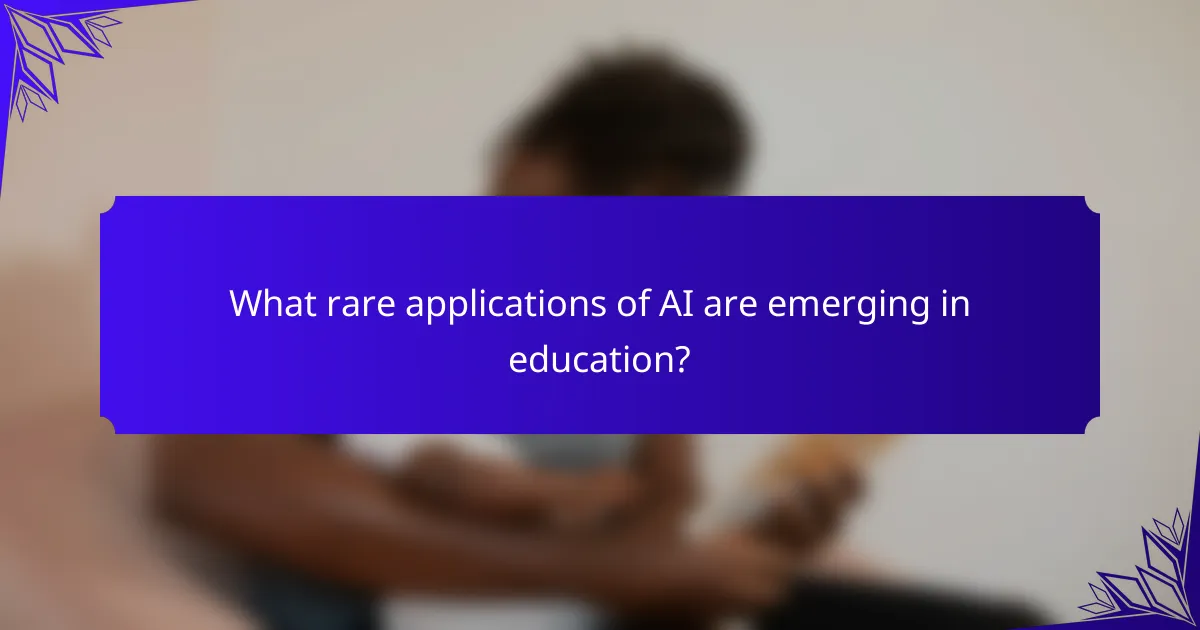
What rare applications of AI are emerging in education?
Emerging applications of AI in education include personalised learning experiences, predictive analytics for student success, and AI-driven tutoring systems. These innovations enhance engagement and address individual learning needs. For example, AI can analyse student data to tailor curriculum and provide real-time feedback. Additionally, virtual reality and AI can create immersive learning environments, offering unique experiences that traditional methods cannot.
How is AI being used for predictive analytics in student performance?
AI enhances predictive analytics in student performance by analysing data patterns to forecast academic outcomes. It identifies at-risk students through early warning systems, enabling timely interventions. Machine learning algorithms process vast datasets, revealing insights into learning behaviours and preferences. This predictive capability supports personalised learning strategies, improving overall educational effectiveness.
What innovative AI tools are being developed for special education?
Innovative AI tools for special education enhance learning experiences and accessibility. Tools like intelligent tutoring systems provide personalised learning paths, while speech recognition software aids communication for students with disabilities. Machine learning algorithms analyse student performance to tailor educational content effectively. Additionally, virtual reality applications create immersive learning environments that cater to diverse learning needs. These advancements address unique challenges in special education, ultimately promoting inclusivity and engagement.
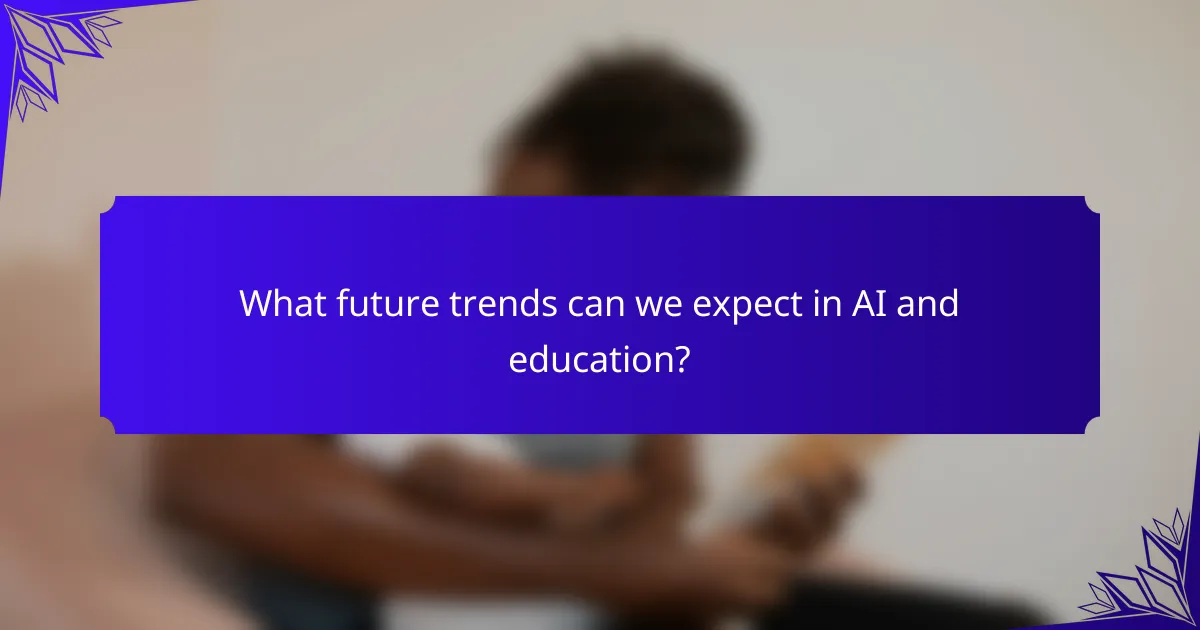
What future trends can we expect in AI and education?
Artificial Intelligence is set to transform education through personalised learning, enhanced accessibility, and data-driven insights. Future trends include adaptive learning technologies that tailor content to individual student needs, AI-driven tutoring systems providing real-time feedback, and the integration of virtual and augmented reality for immersive learning experiences. These advancements aim to improve educational outcomes and engagement while addressing challenges such as data privacy and equity in access. As a result, AI will play a crucial role in shaping the future landscape of education.
How will AI shape the role of educators in the classroom?
AI will transform educators’ roles by enhancing personalised learning and automating administrative tasks. Educators will focus more on mentoring and facilitating critical thinking. AI tools can analyse student performance in real-time, providing tailored resources. This shift allows teachers to devote more time to student engagement and less to grading. Additionally, AI can support diverse learning styles, ensuring inclusivity in classrooms. As a result, educators will become guides in a technology-driven learning environment.
What advancements in AI technology are likely to impact learning outcomes?
Advancements in AI technology are enhancing learning outcomes by personalising education, automating administrative tasks, and providing data-driven insights. Adaptive learning systems analyse student performance in real-time, tailoring content to individual needs. AI-driven analytics help educators identify learning gaps, enabling targeted interventions. Additionally, virtual tutoring powered by AI offers immediate support, improving student engagement and retention. These innovations are reshaping educational experiences, making them more effective and accessible.
What can we learn from current AI implementations in education?
Current AI implementations in education demonstrate enhanced personalised learning, efficient administrative processes, and improved student engagement. These implementations show that AI can adapt to individual learning styles and provide real-time feedback. For instance, AI-driven tutoring systems can analyse student performance and tailor lessons accordingly. Additionally, AI tools streamline grading and administrative tasks, allowing educators to focus more on teaching. The challenges include data privacy concerns and the need for teacher training in AI technologies. Future trends suggest further integration of AI to support diverse learning environments and foster collaborative learning experiences.
What best practices should educators adopt for integrating AI effectively?
Educators should adopt best practices such as aligning AI tools with learning objectives, providing professional development, and ensuring ethical considerations. These strategies enhance the integration of artificial intelligence in education, maximising benefits while addressing challenges. Continuous assessment and feedback loops are essential for effective implementation.
What common mistakes should be avoided when using AI in education?
Common mistakes to avoid when using AI in education include over-reliance on technology, neglecting human interaction, and insufficient training for educators. These pitfalls can hinder effective integration and limit the potential benefits of AI. Failing to customise AI tools to meet specific educational needs can also lead to ineffective outcomes. Additionally, overlooking ethical considerations and data privacy issues can undermine trust in AI systems.


